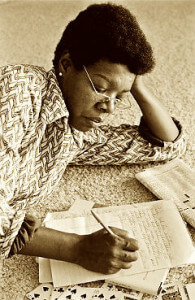Wednesday, June 4, 2014
A tribute to Maya Angelou and her genius.
By Ana Parker Goodwin
The genius of a writer and poet such as Maya Angelou comes only once in a great while and the country will not forget her. She wrote 7 autobiographies, 3 books of essays and several books of poetry. Many movies and plays have also been attributed to her. In her many years of writing she has received dozens of awards and over 30 honorary doctoral degrees. She worked with Martin Luther King and often dealt with racism, identity and family in her writings. Some groups have tried to ban her books from US libraries but ultimately have not succeeded.
Again, as with so many other writers we will have to look at her history to help us understand her writings. Born in St. Louis, Missouri on April 4, 1928, as Marguerite Annie Johnson, she lived with her mother and father until their divorce when she was three. She and her brother were sent to live with her paternal grandmother who treated them very well. And then she was plucked out of her home by her father and sent back to her mother. Shortly after, her mother's boyfriend raped her. She told the family who he was and what he had done. The man was sent to prison for one day and then released. There had been no justice.
Three days later the man was murdered. Many people believed her uncles had killed him. And Maya (the name given to her by her brother) stopped talking for almost five years. In her first autobiography I know Why the Caged Bird Sings, she reveals why she became mute. As a young child she thought her telling about the rape and revealing his name had killed him. Her child mind believed that she would kill other people by speaking. So to prevent the death of others, she became mute. What did she do to survive during that long period of time and beyond while she worked in menial jobs and as a prostitute to make enough money to live? She read, read, read literature and imagined. It brought her through the dark days. During that time she learned to treasure words.
And something she understood more than most of us writers do, was the power of words. She knew that words could drive passions and make a difference. She writes, "Words are things---Some day we'll be able to measure the power of words. I think they are things. They get on the walls. They get in your wallpaper. They get in your rugs, in your upholstery, and your clothes, and finally into you." And yet in her first autobiography, I Know Why the Caged Bird Sings, she credited the human voice as being the true meaning maker of the words she wrote. She writes, "Words mean more than what is set down on paper. It takes the human voice to infuse them with the shades of deeper meaning." Did that deep understanding come from her self induced silence? In the same book she writes, "There is no greater agony than bearing an untold story inside you."
I will leave you with another quote from her to encourage the artist in all of you. "You can't use up creativity. The more you use, the more you have."
And so we say goodbye to a brilliant writer, poet, and human who entered our hearts through her words. Thank you.

2 comments:
One fine writer pays tribute to another. Thank you for this post.
Thank you Elizabeth. I wish I had even half of her talent.
Post a Comment